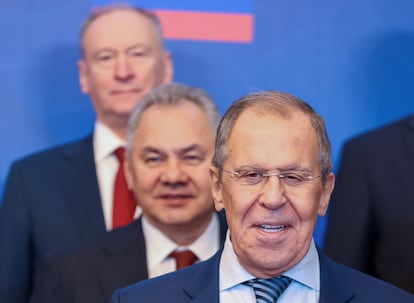Russia’s top diplomat warns any escalation between nuclear powers ‘may become uncontrollable’
As the Ukraine conflict continues, Russian Foreign Minister Sergey Lavrov warned that there was an ‘immense’ risk of a non-nuclear confrontation turning into war


Russian Foreign Minister Sergey Lavrov warned Thursday of the high risk of a conventional conflict escalating into a nuclear war. Speaking at a lengthy press conference, the top diplomat said that nuclear powers – such as Russia and the United States – must avoid military clashes for this reason.
“The risk that a non-nuclear confrontation between nuclear powers will turn into a nuclear war is immense,” he told a news conference on security issues in Moscow. “It is necessary to avoid any military clash between nuclear powers, even with the use of conventional weapons. The escalation may become uncontrollable.”
Lavrov pointed out that Russian President Vladimir Putin and his United States counterpart Joe Biden signed a declaration stating that “a nuclear war cannot be won and must never be fought” in June 2021. A similar statement was also adopted by five nuclear states in January of this year.
“As I have already said, we were ready to go further and say that not only a nuclear war but any war must not be unleashed between nuclear states, it is unacceptable,” he said, adding: “There will be no winner of the nuclear war.”
Since Ukraine’s successful counter-offensive in September and October, Russia has heightened its rhetoric on the conflict, with Putin claiming he would use “all available means” to defend the Ukrainian territories illegally annexed by Russia. “If the territorial integrity of our country is threatened, we will without doubt use all available means to protect Russia and our people – this is not a bluff,” said the Russian president in a televised address to the nation.
The latest comments on the risk of a nuclear war comes as much of Ukraine prepares to face the cold winter months without heating due to Russia’s attacks. Speaking on Thursday, Lavrov justified the strikes against Ukraine’s civilian infrastructure and energy grid, which last week left six million people without power.
“The infrastructure that is targeted by those attacks is used to ensure the combat potential of the Ukrainian armed forces and the nationalist battalions,” he said, adding that the strikes were intended to “knock out energy facilities that allow you to keep pumping deadly weapons into Ukraine in order to kill the Russians.”
Lavrov said Russia was open to talks if the West considered the demands it made in December before Moscow’s troops invaded Ukraine, i.e. for the North Atlantic Treaty Organization (NATO) to withdraw its forces to positions they occupied in 1997, before the first eastern European countries were invited to join the alliance. “We have always said that if someone is interested in finding a negotiated solution, we are ready to listen,” he said.
However, he said it was “naive” of the United States to expect Russia to discuss strategic nuclear issues while – in Moscow’s eyes – trying to destroy the country. “It is crystal clear that it is impossible to discuss strategic stability today while ignoring everything that is happening in Ukraine. Because the goal in Ukraine has been declared – not to save Ukrainian democracy, but to defeat Russia on the battlefield, or even destroy Russia,” he said, in reference to comments made by EU Foreign Policy chief Josep Borrell.
Tu suscripción se está usando en otro dispositivo
¿Quieres añadir otro usuario a tu suscripción?
Si continúas leyendo en este dispositivo, no se podrá leer en el otro.
FlechaTu suscripción se está usando en otro dispositivo y solo puedes acceder a EL PAÍS desde un dispositivo a la vez.
Si quieres compartir tu cuenta, cambia tu suscripción a la modalidad Premium, así podrás añadir otro usuario. Cada uno accederá con su propia cuenta de email, lo que os permitirá personalizar vuestra experiencia en EL PAÍS.
¿Tienes una suscripción de empresa? Accede aquí para contratar más cuentas.
En el caso de no saber quién está usando tu cuenta, te recomendamos cambiar tu contraseña aquí.
Si decides continuar compartiendo tu cuenta, este mensaje se mostrará en tu dispositivo y en el de la otra persona que está usando tu cuenta de forma indefinida, afectando a tu experiencia de lectura. Puedes consultar aquí los términos y condiciones de la suscripción digital.








































